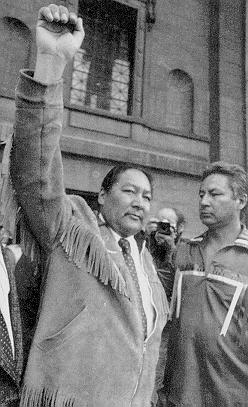The Meech Lake Accord

Overview of the Meech Lake Accord
- Meech Lake Accord (1987)
- An agreement between Canada and Quebec to delegate total control
of the reception and integration of any immigrants that settle in
that province.
- Quebec had 5 demands that needed to be fulfilled before they could
sign the 1982 constitution with 'dignity and honor'.
1. A constitutional veto (meaning any province could block any
constitutional amendment.
2. The recognition that Quebec is a 'distinct society'.
3. The right to have Supreme Court Justices appointed from names on
lists created by the province.
4. The limitations of the federal spending power, namely, the
allowance for a province to withdraw from a national program to
create its own federal monies.
5. Greater provincial control of immigration.
- Expired after 3 years, on June 23, 1990. On that date, the House of
Commons and eight of the ten provincial legislatures had ratified the
accord.
- Aboriginal MLA Elijah Harper of the Manitoba legislature blocked a
ratification vote in that province.
- Newfoundland Premiere Clyde Wells, refused to have a ratification
vote.
The Meech Lake Accord
The constitution in 1982 allowed Canada to make changes to the
governing framework of the nation. The terms however, did not meet
the needs of all Canadians. Some were concerned not everyone's rights
would be protected even under the
Charter of Rights and Freedoms.
Other people had concerns about problems that the constitution failed
to address. Adding to all this, many Canadians believed that unless
Quebec's concern were addressed, there was a high probability that
Canada as a nation might break apart. The Constitution Act of 1982
legally applied to Quebec and its residents, but the province did not
sign it because it did not address its political concerns and issues.
The Meech Lake Accord as created to address all these challenges, and
to bring Quebec into the constitution and to amend the constitution to
answer the concerns of other groups as well. PM Brian Mulroney and all
the provincial premiers, including Robert Bourassa of Quebec signed
the accord on June 3, 1987 at a resort in Quebec called Meech Lake.
An agreement was only reached after a competition bargaining session
where the premiers of each province made a number of concessions.
The Meech Lake Accord was Canada's first attempt at major political
reform under its patriated constitution, and also its first attempt
to amend its own constitution. This accord is considered a test of
the strength of the constitution and the new
amending formula.
Then the accord had to be ratified or approved by Parliament and each
provincial legislature before June 23, 1990. Without the approval of
all ten provincial legislatures and the House of commons, the accord
would be void.
With only four months before the June 1990 deadline, only eight of
the ten provinces and the House of Commons had ratified the accord.
Newfoundland and Manitoba still withheld approval. Premiere Clyde
Wells of Newfoundland introduced a motion in his legislature to
revoke the provinces' support for the accord. Manitoba MLA, Elijah
Harper, a member of the Cree First Nation, stalled debate on the
accord for two weeks because it failed to recognize the unique status
of the aboriginal peoples of Canada.
The deadline passed without ratification and along with it, Canada's
first attempt to amend its own constitution had failed. Soon enough
there was another attempt to reform the constitution;
The Charlottetown Accord.










Copyright © 1998, Phil C. & Hussein B.











